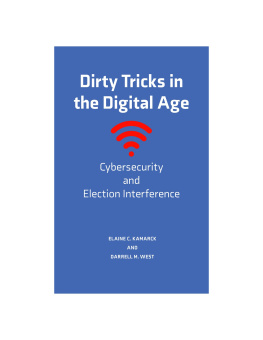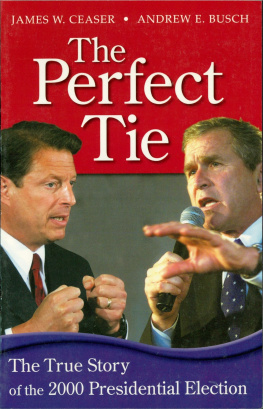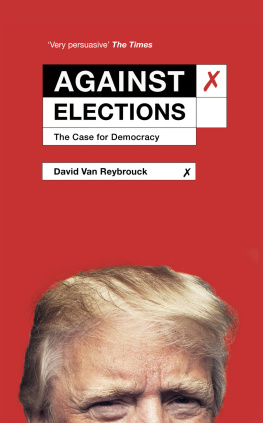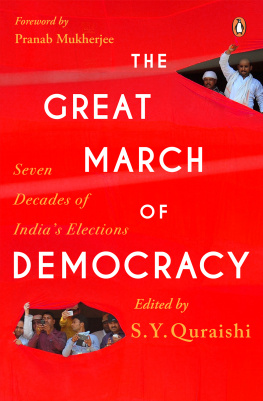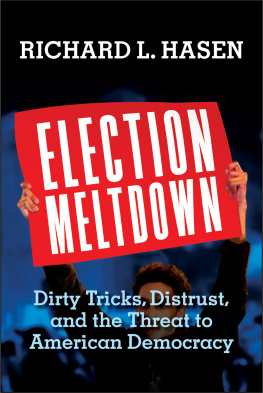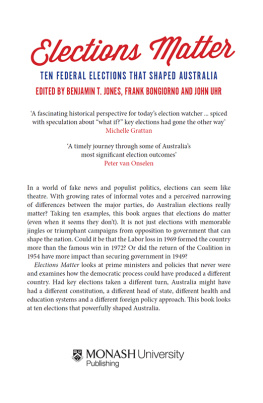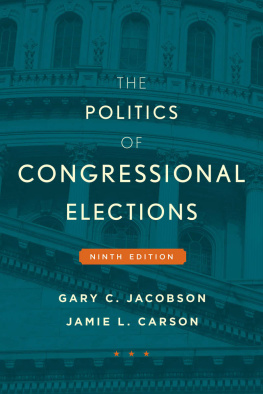Introduction
Youre sitting at home watching online videos and a friend sends you a link showing a seemingly real video of a prominent female politician removing her clothes. This individual is running for a major office and getting lots of news media attention. You watch with amazement. Is this for real? Would a major candidate allow herself to be filmed doing that? How many people will see this? How is it going to affect the campaign?
It turns out that the video is not authentic. Its a deepfake, something that no longer lies within the realm of science fiction or political fantasy. Coined on a Reddit thread in 2017, the term deepfake is used to describe the re-creation of a humans appearance or voice through artificial intelligence. In June 2019, an anonymous AI developer named Alberto created a furor when he devised a deepfake app called DeepNude that could digitally undress women. The software used artificial intelligence to create the deepfake images, presenting realistic approximations of what a womanit was not designed to work on menmight look like without her clothes. The depictions were so realistic that they appeared genuine to many viewers.
In an interview, Alberto explained that he was able to create the tool by training it on 10,000 pictures of naked women. The backlash that ensued in response to the app was so strong that the developer removed the download within a few days of starting to sell it for $50 and also shut down the host website. However, other developers have replicated the software so that the world is not safe from DeepNude knockoffs.
DeepNude, deepfake apps, and other cyber-based creations show how far technology has come and what the political, ethical, and societal risks are as we head into the 2020 presidential campaign. Through current software, it is possible to develop and distribute content that is offensive and abusive. Editing tools are widely available to virtually anyone with access to a computer. Public skepticism about journalists means that it will likely be difficult for news fact-checkers and gatekeepers to act as a counterweight to digital disinformation, doctored images, divisive rhetoric, and outright falsehoods. As we saw in the 2016 presidential campaign, automated bots can distribute such materials widely and potentially affect the election outcome.
All of this is taking place in a country that is intensely polarized and where there is a widespread tendency to view political opponents as enemies to be destroyed and a willingness to believe the worst about your opponents. Social media platforms have shown a reluctance to police themselves aggressively. After it was discovered that a slowed down video made Nancy Pelosi, the speaker of the House of Representatives, look bumbling, possibly drunk, and out of touch, Facebook refused to remove the video, merely labeling it as fake and something viewers should judge for themselves. The current moment creates a ready-made environment for the online distribution of toxic information.
Dirty Tricks Are Not New
The distribution of toxic and misleading information is not new. Before the days of Facebook and Twitter this used to be called dirty tricks. While the medium may be different, the goals are as old as elections themselves. To understand how to defend democracy in the internet age, we need to understand the world of dirty tricks in the pre-internet age.
To do that, we should first distinguish between dirty tricks and negative campaigning, including attack ads and contrast ads. The latter may be offensive but they are based on something that is true as opposed to something that is a wholesale fabrication.
For instance, lets consider one of the most infamous ads from the 1988 presidential campaign, which pitted Vice President George H. W. Bush (R) against Governor Michael Dukakis (D). The Willie Horton ad has gone down in history as one of the more offensive and racially incendiary ads. While out on furlough as part of a program in Massachusetts, Willie Horton, a black man convicted of murder, kidnapped a young couple, stabbing the man and raping the woman. The ad features a scary photo of Willie Horton and under a photo of Michael Dukakis it says Allowed Murderers to have Weekend Passes. The weekend furlough program was created in 1972 under a Republican Governor as the result of a court decision. Dukakis himself defended it.
But both the program and Willie Horton were real. The circumstances surrounding the crime were accurately described, the visual image was true to life even if sensationalized, and there were numerous news stories attesting to the facts of the case.
Now compare this ad to a conspiracy theory that went viral during the 2016 presidential campaign about which nothing was real: Pizzagate. Social media outlets spread a story related to Clinton campaign manager John Podestas hacked personal email account: that his emails contained coded messages referring to human trafficking and a child sex ring run by high-ranking members of the Democratic Party, including Hillary Clinton. This activity was allegedly based in a Washington, D.C., pizzeria called Comet Ping Pong. The conspiracy theory spread quickly, promoted by various right-wing websites and by the Russians. As the rumors grew, so did the harassment of the owners and employees of the pizzeria, culminating in a shooting incident carried out by a North Carolina man who took it upon himself to go to Washington and rescue the poor children.
Nothing about Pizzagate was real. There was no sex ring, no coded messages, and no children being held against their will in the basement of a pizzeria. All of the supposed facts that were spread were completely fabricated.
To understand the world of dirty tricks it helps to understand their function in the context of elections, which are fought over a finite period of time. Election Day is the endpoint and public interest increases as it approaches. Unlike a dirty trick against a corporation, which might be remedied in time for a product to rebound, a dirty trick timed to occur before Election Day can have a definitive impact even if it is proven to be false. The ramifications can be enormous because U.S. elections cannot be re-run.
A brief summary of some of the dirty tricks in American elections shows that they tend to have the following objectives:
- create doubt around a candidates character;
- confuse the voters about the election;
- break into the opponents sphere and get information on the candidate;
- affect the actual outcome by interfering with the counting process or through voter suppression efforts.
Candidate Character
Sex has long been a favorite topic of the dirty trick. In the early 1800s, politics was no less suffused with innuendo than today. Among the most salacious stories were those penned by the partisan journalist James Callender, who alleged in a series of articles that Thomas Jefferson had fathered several children with his young slave, Sally Hemings. For nearly two centuries this was held up as an early example of dirty campaigning. In 1998, thanks to DNA testing, it turned out that Thomas Jefferson had indeed fathered illegitimate children with his slave.
Two centuries later, the combination of illicit sex and race was still the ideal fodder for the creation of a dirty trick. In the 2000 Republican presidential primary, Governor George W. Bush of Texas was running against Senator John McCain of Arizona. McCain won the New Hampshire primary and the race went on to South Carolina, where the Bush campaign knew they had to stop McCain. Using a push poll of survey questions to spread false information, opponents of McCain undermined his candidacy. Phone calls to South Carolina Republican voters asked Would you be more or less likely to vote for John McCain... if you knew he had fathered an illegitimate black child? McCain and his wife Cindy had adopted a dark-skinned girl from Bangladesh in 1991 and that child, Bridget, was campaigning with them in South Carolina.

